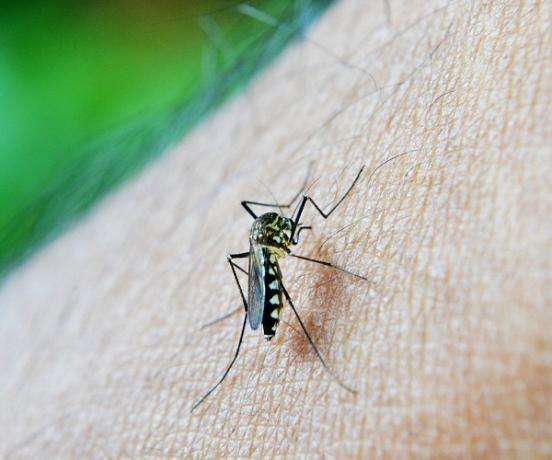Dengue is a febrile infectious disease caused by a virus and transmitted by the bite of the female mosquito Aedes aegypti, main vector of the disease.
The word "dengue" is of Spanish origin and means "trick" or "tenderness", referring to the state in which the sick individual is found.
The etiologic agent (causer) of dengue is a arboviruses (insect-borne virus) of the genus Flavivirus, which belongs to the family Flaviviridae. There are four variations or serotypes: Den-1, Den-2, Den-3 and Den-4.
The disease is typical of tropical and subtropical areas, where environmental conditions favor the development of the mosquito. Dengue occurs on all continents except Europe, where outbreaks of the disease are very rare.
Types of Dengue
There are two forms or types of dengue: classic and hemorrhagic.
classic dengue
is the occurrence most common disease, presenting itself in a lighter way. Symptoms can be felt for approximately 6 days and the main ones are: fever, headache, pain in the body, joints and behind the eyes, nausea and vomiting.
Symptoms of malaise can last a few more days, but if treated, the disease is curable and does not pose a risk to the patient's life. Classic dengue usually has a benign evolution and rarely causes the patient's death.
However, it is important to be aware: because it presents in a milder form, the disease is often mistaken for a flu, which can delay the diagnosis and the start of treatment.
Dengue hemorrhagic fever
It is also called dengue hemorrhagic fever or dengue shock syndrome, being the most severe form of the disease. It causes changes in the patient's blood clotting process and if not treated properly, it can lead to the patient's death.
In addition to the common symptoms of classic dengue, there is a tendency for bleeding, severe abdominal pain, clammy, pale and cold skin, agitation, drowsiness and difficulty breathing.
If not treated correctly, the disease can lead to some complications, called Dengue shock syndrome. These complications can involve mental confusion, loss of consciousness, severe dehydration, and heart and breathing difficulties.
Dengue Transmission
Dengue transmission occurs through the bite of the Aedes aegypti. After biting someone infected, the mosquito is able to transmit the virus after 8 to 12 days of incubation. The incubation period for dengue in the infected person can vary between 3 and 15 days.
 Aedes aegypti - the mosquito that transmits the dengue virus
Aedes aegypti - the mosquito that transmits the dengue virus
Mechanical transmission of the virus can also occur, when the bite is interrupted and the mosquito immediately feeds on a nearby susceptible host.
the transmission does not occur by direct contact with the sick or with their secretions, not even through sources of water or food.
dengue symptoms
Dengue has several symptoms that can indicate that the patient has the disease. Some may vary according to the type of dengue (classic or hemorrhagic). The main symptoms are:
- High fever (above 39°C)
- Headache
- Body and joint pain
- Vomiting and Nausea
- Somnolence
In some situations, the patient may also present:
- Bleeding (nose, gums, eyes)
- Abdominal pain
- breathing difficulty
- Change in urine color
It is important for the person with these symptoms to avoid self-medication. It is recommended that you quickly seek out a healthcare facility to obtain a correct diagnosis and receive the most appropriate treatment.
dengue treatment
There is no specific treatment for dengue, and the therapeutic measures adopted are only aimed at maintaining the patient's general condition and relieving symptoms.
In cases of classic dengue, the recommendations are: rest, light food and fluid intake to avoid dehydration. These measures are important to ensure the patient's quick recovery.
Drugs not indicated in the treatment
The use of medications derived from acetylsalicylic acid used to combat pain and fever is contraindicated as they can cause bleeding.
For the same reason, the use of some anti-inflammatory (non-hormonal) drugs is also contraindicated.
